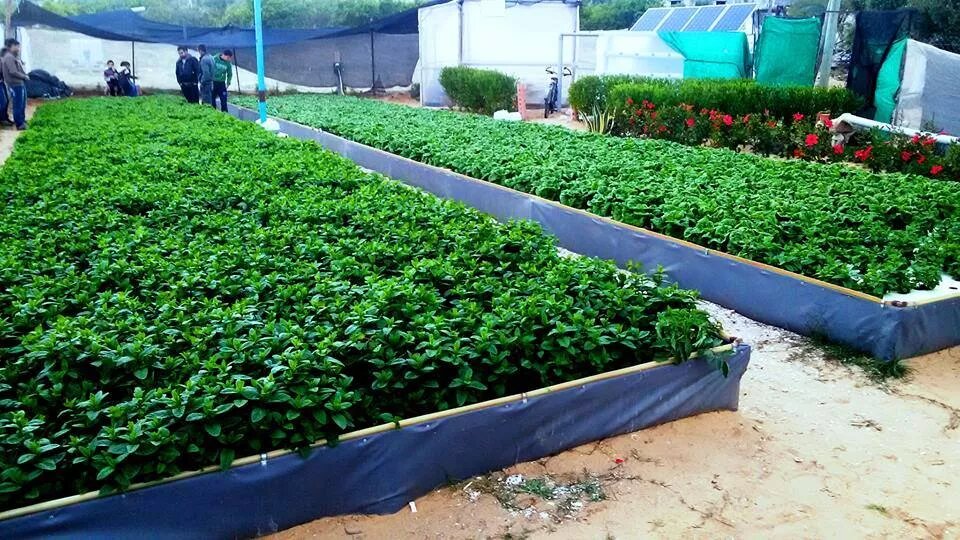
23 May 2016
Gaza (NAWA) - Dua’ Shaheen
Without a plow or an axe, farmer Eyad al-Attar tours his crops in his lush green limited land, as he uses hydroponics as a new agricultural way which excludes soil.
In his land, which does not exceed two hundred square meters, located in Beit Lahia north of the Gaza Strip, where agriculture is an inherited profession from generation to another, al-Attar wanders between his water basins, proud of the production that was finally accomplished: “soilless plants”.
Al-Attar talks about his farming experience in hydroponics as a qualitative leap in the field of diverse crop production for the first time in Palestine: “I was thinking of hydroponics since 2012. The scarcity of fresh water, limited agricultural land, and soil contamination in Gaza led me to it. All I wanted was to get a safe plant. I performed many experiments, some of which failed due to the frequent attacks by the Israeli occupation on the Gaza Strip, when the Israeli forces bombed the greenhouses in my land, killing the plants, and also the shortage of techniques”.
Al-Attar's success story in hydroponics began earlier this year, relying on his expertise and personal effort, with some funding from the Food and Agriculture Organization (FAO). In this type of farming, there is no need for traditional farming tools, as all what one needs is some perforated square pieces of white thermal insulation, water, organic nutritionals, a nutrient solution, and electrical water pumps to speed water flow.
Hydroponics is considered the ideal solution in Gaza due to the fact that soil is contaminated by radiations and chemicals from missiles and explosive barrels during the previous wars on the Strip. This has led to a change in soil color to dark and black in some areas which were dedicated for cultivating types of vegetable and essential nutrients, and this poses a threat.
Al-Attar illustrates how agriculture without soil is performed despite the challenges he faces, most notably electricity blackouts, but he is still continuing. The basins have been filled with water which is mixed with a nutritious solution that contains multiple nutrients, such as nitrogen, oxygen, and sulfur, in addition to calcium and potassium.
He continues: “afterwards, floating styrofoam boards are placed above water. The boards are drilled with circular holes through which plants grow. And the pump supplies the crop with water until the materials are equally distributed inside the plants’ roots and prevent its sedimentation”.
Al-Attar adds "the crop’s life duration continues until it ripens, between 21 and 60 days maximum, depending on its type; lettuce, tomatoes, strawberries, cucumbers and others".
Hydroponic farming has been distinguished as being healthy and safe because it uses neither chemicals nor fertilizers, doesn’t consume agricultural lands, and could be performed in lands adjacent to homes or on rooftops.
Al-Attar adds "hydroponics reduce the need of fertilizers and water to almost one third, and does not need highly expensive and carcinogenic soil sterilizing materials. Therefore, a crop is produced in a shorter time and with less effort".
According to soil samples results that have been examined in the primitive laboratories of the Ministry of Health in Gaza, the level of hazards that resulted from the presence of nickel in the soil amounted to 73.2%.While chromium amounted to 81.8%, copper 72.95%, magnesium 88.8% and cobalt 98.1%. As for lead, it accounted for 64.1%.
In an interview with the General Director of the Soil and Irrigation in the Ministry of Agriculture, Nizar Al-Whaidi, he values al-Attar’s effort in inventing a new way of planting other than the common way, aware of the importance of these hands which create achievements regardless to the hard situation in the Gaza Strip.
Al-Whaidi asserts the importance of such agriculture, considering it "a dramatic change in the agricultural field in Gaza as it saves water and fertilizers and conserves the environment. Moreover, it is the ideal model in light of the scarcity of natural resources, continued urban sprawl and also to overcome the problem of water shortage in the Gaza strip".
Al-Wahaidi adds that "the Ministry is seeking to increase these modern systems and urban farming methods to enable the Palestinian citizen to produce his or her food in a healthy way at the lowest possible costs".
A hectare of hydroponics could produce more than 300 tons of vegetables annually, which is five to ten times more than the produce of any crop that has been grown in agricultural lands which depend on traditional soil.
Al-Whaidi advises every farmer who wants to conduct this experiment to depend on training courses held by the Ministry of Agriculture and relevant institutions, in order to gain sufficient background to ensure the project’s success. He also recommends having a constant and guaranteed power source as well as using solar electricity electrical disconnection from the pump causes problems for the cultivated plants.
Gaza always excels in all life and professional fields despite the lack of resources, as al-Attar could aptly demonstrate the importance of investing everything available to ensure food security and to overcome all obstacles, also in addition, he's thinking of exporting. This is how Palestinian citizens in the Gaza Strip, and regardless to the occupation’s pursuit of polluting the soil, could produce agricultural crops which are toxins free.
Originally published in Arabic on NAWA.PS


